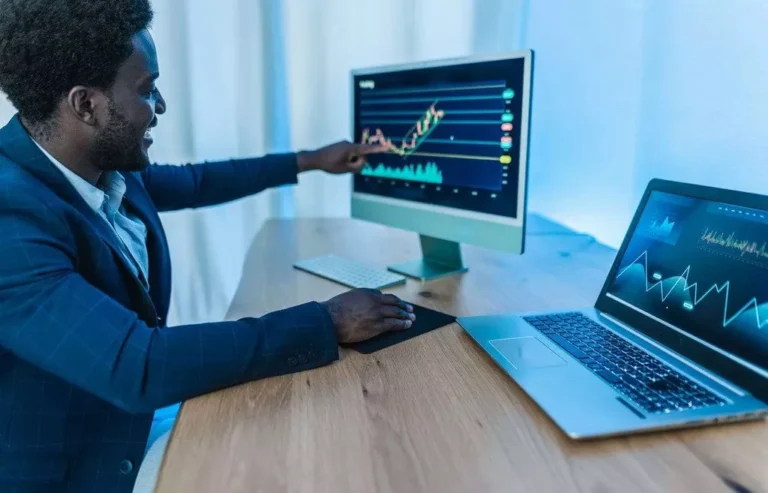Investors who bought at the top of an intra-day price surge that often occurs in high-profile listings would have fared even worse, with an average loss of 53%. IPOs of the past four years are down an average of 47% from the closing price on their first day of trading, the analysis of LSEG data as of Friday showed. If those IPOs succeed, they will likely trigger a wave of stock market launches in 2024, bankers and analysts said. PARIS (AP) — French regulators ordered Apple to stop selling the iPhone 12, saying it emits electromagnetic radiation levels that are above European Union standards for exposure. The company disputed the findings and said the device complies with regulations. Please note that an investment in digital assets carries risks in addition to the opportunities described above.

One option is to use an mm broker that offers access to multiple liquidity providers, increasing your chances of getting the best available bid-ask spread for your trades. There are two main types of market makers; institutional and retail. The benefits of price improvement flow directly into investors’ pockets. We saved retail investors over $1.4 billion in 2021 alone. Our work helps reduce the cost of market participation and increase access to financial opportunity. Market makers’ presence streamlines the execution of trades, reduce fluctuations in prices and identify supply and demand gaps.
The first thing you want to check when choosing a market maker is their regulations. Look for brokers regulated by reputable regulatory bodies such as the Financial Conduct Authority (FCA) or the Australian Securities and Exchange Commission ( ASIC). So, here’s what you need to do to choose a suitable forex market maker. Market makers also play an important role in ensuring market stability. Providing liquidity and maintaining orderly trading conditions help prevent excessive price swings and reduce the risk of market disruptions. Futures and futures options trading is speculative, and is not suitable for all investors.
Market makers are employed to ensure sufficient liquidity and efficient trading on financial markets.
Most brokers allow both long positions and short positions. But if you want to short, it’s wise to pick a broker with expertise in managing borrows. Market makers sometimes manage a few hundred stocks at once. They keep track of their bid-ask spreads, their position sizes, and their total capital. Market makers monitor the entire market, including stocks, options, and futures on stock indexes, many of which are listed on one or more of several exchange and execution venues.
What Is an Automated Market Maker? A Beginner’s Guide – Unchained
What Is an Automated Market Maker? A Beginner’s Guide.
Posted: Tue, 19 Sep 2023 12:30:00 GMT [source]
One function of market makers is to ensure orderly trading of publicly listed securities, particularly during Initial Public Offerings (IPOs) or other capital raising activities. Market makers provide liquidity, which ensures investors can trade quickly and at a fair price in all conditions. The old Wall Street movies give a perspective of this past era. In that day, brokerages would call in orders to the exchange and then specialists on the floor of the exchange would pair those orders with a willing counterparty. And, if there wasn’t one, the specialist would buy or sell the stock themselves out of their own inventory.
How Do Market Makers Earn a Profit?
They hold an inventory of securities or even physical currencies for trade. During a trade, they provide investors with better prices. In an effort to combat the risks of trading, market makers are given the benefit of a two-way quote. Consequently, they offer to buy and sell prices together in a quote. The profit from a difference in the prices is a reward they earn for taking the risk. The answer lies in principal trades – market makers that function as brokerages have an incentive to promote securities that they are holding, in order to make their own trades more profitable.

Once the market maker receives an order from a buyer, they immediately sell off their position of shares from their own inventory. With its business booming at the height of the pandemic in March 2021, the company raised money at $125 to rack up a $39 billion valuation – nearly four times what it’s valued at in Tuesday’s listing. The $30-a-share pricing set by Instacart sits at the top end of guidance the online grocery delivery start-up gave investors last week, amid signs the IPO market could be heating up again.
In January of 2021, the buying and selling of “meme stocks” like GME and AMC were limited by the likes of Robinhood and TD Ameritrade. On the one hand, market makers provide much-needed liquidity to the forex market. They also offer various services and tools to help traders improve their performance and make more informed trading decisions. These crypto market making market makers cater to individual traders and smaller financial institutions. They may offer smaller trade sizes and account minimums, but their spreads may be wider than institutional market makers. Rather than tracking the price of every single trade in Alpha, MM’s traders will look at the average price of the stock over thousands of trades.
- Despite MMs’ best efforts, sometimes assets lose value in the blink of an eye.
- The person on the other side of your order doesn’t have all the answers.
- Brokers act as intermediaries between clients and market makers – and market makers act as intermediaries between brokerages and the wider market, much like a wholesaler.
- Another reason why market makers are needed is that they ensure price continuity on a market with a relatively narrow bid-ask spread, which we will get to in a moment.
- That’s it for this guide – we hope enterprising investors around the globe will find it helpful.
- By taking the market risk to trade in this fashion, market makers can earn a ‘spread’ between the bid (what someone is willing to pay for a security) and the ask (what someone is willing to sell it for).
Toronto is considered to be Canada’s financial capital, which is where the country’s leading stock exchange is located. The Toronto Stock Exchange (TSX), which is the country’s largest exchange, is owned by TMX Group. The NYSE and Nasdaq are the two main stock exchanges in the United States. Market makers are compensated for the risk of holding assets because they may see a decline in the value of a security after it has been purchased from a seller and before it’s sold to a buyer. Each market maker displays buy and sell quotations for a guaranteed number of shares.
Don’t worry, we’ll break it down so that it is much easier to understand. When one thinks of the stock market, one of the first things that spring to mind is how many millions of transactions are executed every day. On average, the NYSE sees between 2 and 6 billion transactions every day, while NASDAQ experiences 4.5 billion each day – and those are just two stock exchanges. Retail market makers often offer fixed spreads to their clients, while institutional market makers may offer variable spreads that adjust based on market conditions. Determining to price isn’t an easy process, and there are several things market makers need to consider, such as liquidity, currency exchange rates, and trading volumes. Market-maker spreads widen during volatile market periods because of the increased risk of loss.
Adam Hayes, Ph.D., CFA, is a financial writer with 15+ years Wall Street experience as a derivatives trader. Besides his extensive derivative trading expertise, Adam is an expert in economics and behavioral finance. Adam received his master’s in economics from The New School for Social Research and his Ph.D. from the University of Wisconsin-Madison in sociology. He is a CFA charterholder as well as holding FINRA Series 7, 55 & 63 licenses.
Market makers are obligated to sell and buy at the price and size they have quoted. The reduced commission can range from approximately $5 to $15 per trade. The low https://www.xcritical.in/ fees are based on trading volume, and since there’s no investment advice, employees of online brokers are usually compensated by salary instead of commission.
This type of order is also called a stop loss because you enter it at the limit price you want to sell and let the market dictate whether your stock trades down that far. Market makers provide liquidity in the marketplace by ensuring an interested buyer or seller for every security they trade. Basically, ComputerShare allows investors to directly purchase stocks. This stands in contrast to the traditional route of going through a stock brokerage, where the brokerage itself holds the shares for the investor. A limit order sidesteps this – it includes a limit as to how much an investor is willing to pay at most and a time limit on how long the order is good for.
Once posted, a market maker has an obligation to honor that offer if a trader wants to transact at that price. This creates a reliable ecosystem for traders, since they can see through level two quotations just how much bid and ask is available at varying prices. But it also gives market makers much more power than the average retail trader in a transaction. Brokers also have different rules for what they’ll make available to traders and investors. While most brokers allow trading listed stocks, some restrict penny stocks and cryptocurrency. But the important thing stock investors want to know is how market makers are regulated when it comes to quoting the bid-ask spread.
